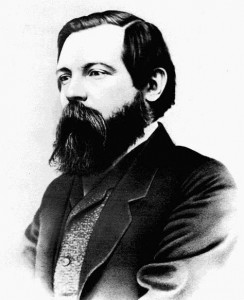by: Friedrich Engels.
ABOUT THE AUTHOR:
(28 November 1820 – 5 August 1895) was a German social scientist, author, political theorist, philosopher, and father of Marxist theory, alongside Karl Marx. In 1845 he published The condition of Working Class in England, based on personal observations and research. In 1848 he co-authored The Communist Manifesto with Karl Marx, and later he supported Marx financially to do research and write Das Kapital. After Marx’s death, Engels edited the second and third volumes. Additionally, Engels organized Marx’s notes on the “Theories of Surplus Value” and this was later published as the “fourth volume” of Capital. He has also made important contributions to family economics.
” THE GREAT TOWNS” SUMMARY:
In the chapter “The Great Towns”, Engels struggles to analyze under what conditions the people of working class in England of 1840s make a living in the urban district of Manchester. The method the author employs while carrying out his study appears to be peripatetic in the sense that he strives to reveal the horrors of industrial urbanism by merely walking around. While conducting a tour in various neighborhoods of proletarian Manchester, he explicitly points out his observations of appalling living conditions of the working class so that he renders his assertions reasonable. According to Engels, there was a connection between the physical decrepitude of the urban infrastructure and the alienation and despair of the urban poor. Hence, in The Great Towns, he stresses the ‘degradation’ of the working class with regard to the “hypocritical town planning” in the city of Manchester. From Engels’ perspective, the lack of city planning especially in the great cities under the force of capitalism was organized in such a way that would properly serve the interests of the advantageous class, that is to say the bourgeoisie. Even after his death in 1895, this view has been the prevailing one among the academic milieu. As a consequence, many scholars have attempted to clarify the inner-city development, which was an issue first coined in and identified by Engels.
In The Great Towns, Engels first introduces to the reader the “tacit agreement” which organizes the streets in order to keep each person on his own side of the pavement. This way, he argues, no one delays the opposing streams of the crowd. For Engels, this tacit agreement ultimately isolates the individual in his private interest, in some cases making him become even offensive. Engels indicates that this isolation of the individual, this narrow self-seeking constitute the fundamental principle of society. From Engels’ point of view, this isolation brings about the “social war” that is the war of each against all. One might refer to this social war as a corollary of the capitalist system because in this war people regard each other as only useful subjects. In this regard, they exploit each other and in the end the stronger acquires for himself a better position.
REFERENCES:
http://en.wikipedia.org/wiki/Friedrich_Engels
http://faculty.wwu.edu/zaferan/472%20engles%20article.pdf
http://ydemokrat.blogspot.com/2010/12/friedrich-engels-condition-of-working.html
published by:
Fatima Rashid AlNuaimi
As Friedrich Engels starts off describing ‘The Great Towns’, he begins by stating how there is almost no interaction between individuals within the public spaces of Manchester. He sees their contact forced and almost merely co-existence. In fact, the presence of a common space for the people is almost few to none. This was the result of the boundaries between the rankings within the society. Engels’ reference to the classes within the society during the industrial revolution through his own perspective leads to how the noble towns have been unconsciously organized.
The minimal interaction between the working class and the elites somehow lead to the layout that Manchester was in during the industrial period. Engels believe that it was a result of an inferred agreement that the higher ranked individuals are segregated from the lower ranked people. As a result of this, the city was laid out to keep the lower ranked individuals from mixing with the sophisticated classes.
The residences and few shops of the working class individuals are found in areas nearer to the warehouses and factories. These district is then masked by the more pleasing retail buildings where few to none working-class individuals could be seen walking down the streets. As Engels illustrates the egoistic approach to how Manchester was laid out, the more it shows how the arrangement aims to lessen, if not avoid, the exposure of the elites to the lower class.
The middle class individuals share streets with the commercial shops that provides them their necessities and desires. However, the middle class district is incomparable to that of the higher class. According to Engels, the elites have large portions of lands with streets that lead directly to their businesses which, again, aims to act as a canopy to the reality of what has given them their wealth.
Reference:
LeGates, R. & Stout, F. (24 Feb 2011). The Great Towns by Friedrich Engels. The City Reader Fifth Edition, 46 – 54. Routledge.
Relevance to Doha:
In the article, the emphasis on the segregation of ranks within the society brought into mind the fact that this still exists within Doha. This segregation creates a disconnection between the people in different rankings from each other which creates a less lively atmosphere within the city. As a thought, a better integration of both the single workers and the family sectors within future public spaces and activities would be helpful in creating a more vibrant city ambiance.
Edited by: Angelica Caccam

